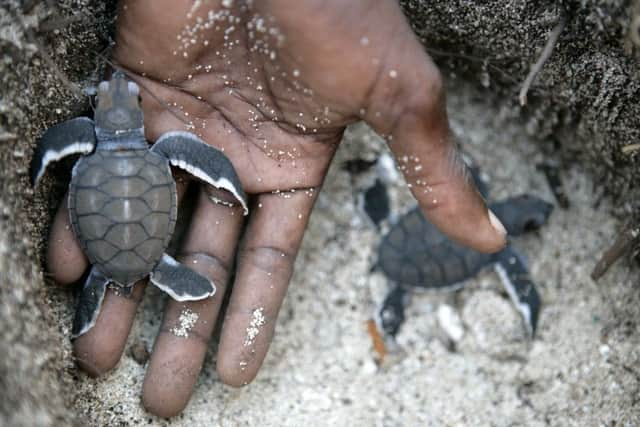Lottery of life can help baby turtles


Last year I was delighted when, thanks to players of People’s Postcode Lottery, we were able to provide funding for an initiative to help protect endangered turtles in an area known as the “jewel of Africa”.
Working with local communities and WWF’s conservation staff on the ground in Lamu, Kenya, the support we receive from people across Scotland is helping us protect a species which has been on the planet for more than 100 million years.
Advertisement
Hide AdAdvertisement
Hide AdSo why Lamu? Well its home to half of all turtle nests along the Kenyan coastline, and thanks to the additional funding we have been able to scale up our marine turtle conservation work in the region. Since becoming involved in the project, I have learned how important this work is – climate change, the development of a major shipping port and unsustainable fishing practices are putting the turtles, one of nature’s true survivors, in danger. We need to protect turtles as they’re important predators that help to keep marine food chains healthy. For instance, hawksbill turtles play an important role in protecting coral reefs by eating marine sponges, which would otherwise out-compete reef-building corals. Similarly, by grazing on seagrass beds, turtles keep them clipped and healthy. The leatherback turtle is a major predator of jellyfish, which eat fish larvae – so having turtles around helps stop jellyfish from depleting fish stocks.
Now is a critical time for the turtles as March to August is the peak nesting season in Lamu. My colleagues, plus a team of volunteers, are working tirelessly night and day to help protect adult female turtles, nests and hatchlings. So far they have recorded over 100 nests, including a hawksbill nest and green turtle nests. When you think only one in a thousand newly hatched turtles survive to adulthood, it becomes clear how important it is that efforts are increased to protect them.
As well as safeguarding the nests, the team works to raise awareness of the ecological and cultural importance of turtles, and makes sure local indigenous knowledge is recorded. Staff and local volunteers also collect and analyse data on turtle activity, as well as forming beach patrols to keep the area clean and free any turtles accidentally caught in fishing nets.
Not only does this link between Scotland and Lamu help ensure this vital work can continue, but there are other links too. These majestic creatures are no strangers to our seas. Giant leatherback turtles have been known to find their way to Scottish waters, creating a lot of excitement when they do. We know that the public of Scotland will welcome the fact that there’s now a Scots-backed project that’s designed to help these and other marine wildlife.
TV presenter and WWF ambassador Simon Reeve has visited the seascape around Lamu and has spoken of his passion for it, and his desire to help ensure turtles continue to play their important role in maintaining the health of the coral reef habitat. He reported that during a visit to Lamu while travelling around the Indian Ocean for a BBC TV series he was absolutely blown away by the beauty and history of the place. But despite the issues facing the people and nature of the Lamu seascape, his message to supporters of our work there is one of hope. I could not agree more with Simon. We must all strive to protect our natural world on behalf of all those who depend on it or love it, and – of course – for the benefit of future generations as well.
Over the past five years WWF Scotland has received over £1m from players of People’s Postcode Lottery for our work on climate change and marine issues both here and abroad.
• Lang Banks is director WWF Scotland www.wwf.org.uk/scotland For more information about WWF’s work in the Lamu seascape, follow the blog from WWF-Kenya’s Mike Olendo: https://blogs.wwf.org.uk/biographies/mike-izava-olendo/